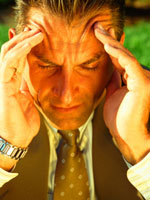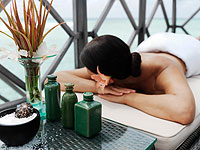
MONDAY, March 9, 2009 — Most people who are prone to headaches or migraines suspect that certain things, such as red wine or strong perfume, can trigger their head pain. Now a new study suggests that rising temperatures could trigger headaches, too.
According to a study published Monday in the journal Neurology, a spike in temperature may be enough to land some headache-prone people in the emergency room. The researchers found that for every 5-degrees-Celsius increase in temperature, the risk of a hospital-related headache visit went up 7.5 percent in the next 24-hour period. And a drop in barometric air pressure, which tends to happen before it rains, was also linked to a greater risk of headaches in the next 48 to 72 hours.
While people may think they’ve got a handle on their migraine triggers, in truth, weather changes may be to blame for at least some of those headaches, says Kenneth J. Mukamal, MD, the study’s lead author and an associate professor of medicine at Harvard Medical School in Boston. “In the summer, you may think that ice cream set off your migraine,” he says. “But it wasn’t the ice cream—it was the temperature increase on that very hot day that led you to eat the ice cream.”
Dr. Mukamal’s team looked at 7,054 patients diagnosed with headaches in the emergency room of Boston’s Beth Israel Deaconess Medical Center over a span of seven years; they compared factors like temperature, barometric pressure, humidity, and pollution for the period immediately preceding and following each patient’s hospital visit. While temperature and barometric pressure were linked to headaches, pollution—which is linked to a greater risk of heart attack and stroke—was not associated with migraines. But Dr. Mukamal isn’t ruling out the possibility. “Our city was not big enough to say for sure that air pollution is off the hook,” he says, adding that a similar study performed in Los Angeles (where air pollution levels are considerably higher) might yield different results.
The study isn’t without limitations, though: It excluded migraines that did not result in a trip to the hospital, says Ellen Drexler, MD, associate professor of neurology at the Mt. Sinai School of Medicine in New York City.
Migraines affect up to 18 percent of women and 6 percent of men in the United States. So do the headache-prone need to stay indoors when the temperature starts to climb? Not necessarily, experts say.
Instead of holing up in an air-conditioned home, a migraineur may be able to take medication to prevent head pain. For example, taking beta-blockers is one way to prevent a migraine. But many people don’t like taking routinely taking prescription drugs to prevent migraines, says Dr. Mukamal. “Migraines often happen to younger people, who have a particular reticence to daily medication,” he adds.
Not all experts would recommend using medication to prevent temperature-change-related migraines. “I certainly would not suggest that a patient take symptomatic medication such as a triptan just because of a weather prediction—especially considering the track record of our weathermen,” says Dr. Drexler. “Although a dose of a simple analgesic in the morning might be helpful for some people.”
Overall, the weather probably is not as a big a migraine trigger as, say, a glass of Cabernet, explains Dr. Drexler. She recommends that patients keep pain diaries and log in weather conditions as well. If a patient finds that weather is, in fact, a trigger, he or she can potentially avoid a migraine by taking extra precautions to avoid other triggers (such as caffeine) on those days.
Read more...




